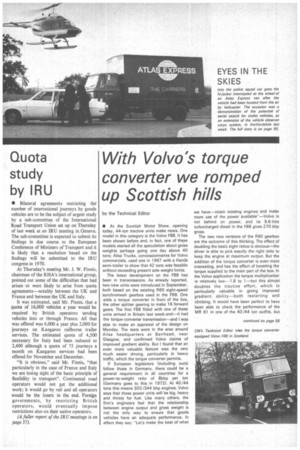Quota study by IRU
Page 55

If you've noticed an error in this article please click here to report it so we can fix it.
• Bilateral agreements restricting the number of international journeys by goods vehicles are to be the subject of urgent study by a sub-committee of the International Road Transport Union set up on Thursday of last week at an IRU meeting in,Geneva. The sub-committee is expected to submit its findings in due course to the European Conference of Ministers of Transport and it is likely that a resolution based on the findings will be submitted to the IRU congress in 1970.
At Thursday's meeting Mr. J. W. Finnis, chairman of the RHA's international group, pointed out some of the difficulties that had arisen or were likely to arise from quota agreements—notably between the UK and France and between the UK and Italy.
It was estimated, said Mr. Finnis, that a quota of 16,000 vehicles a year would be required by British operators sending vehicles into or through France. All that was offered was 6,000 a year plus 2,000 for journeys on Kangaroo railborne trailer services. The estimated quota of 4,500 necessary for Italy had been reduced to 2,400 although a quota of 75 journeys a month on Kangaroo services had been offered for November and December.
"It is obvious," said Mr. Finnis, "that particularly in the case of France and Italy we are losing sight of the basic principle of flexibility in transport". Continental road operators would not get the additional work; it would go by rail and all operators would be the losers in the end. Foreign governments, by restricting British operators, would eventually impose restrictions also on their native operators.
(A fuller report of the IRU meetings is on page 57).




































































































































































































































